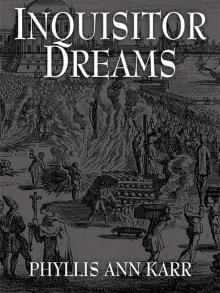- Home
- Phyllis Ann Karr
The Idylls of the Queen Page 17
The Idylls of the Queen Read online
Page 17
“Lancelot!” I said. “You’re jealous of her because of Lancelot. If Her Grace were out of the way, you think you might yet lure the Mirror of Perfect Knighthood into your bed.”
At last Morgan stopped stroking her cat. She gazed at us for a moment, then rose and picked up a lamp. “Come with me. I have made up my mind to show you something I have shown to very few.”
Mordred and I followed her out. Nimue stayed behind. The dark cat, which had leaped from Morgan’s lap when she stood, sprang up and settled comfortably in Dame Nimue’s white skirts instead.
CHAPTER 21
Dame Morgan’s Tale of Sir Lancelot’s Pictures on the Walls
“Thus as they rode they heard by them a great horse grimly neigh, then were they ware of a sleeping knight, that lay all armed under an apple-tree; anon as these queens looked on his face, they knew it was Sir Launcelot. Then they began for to strive for that knight, everych one said they would have him to her love. We shall not strive, said Morgan le Fay, that was King Arthur’s sister, I shall put an enchantment upon him that he shall not awake in six hours, and then I will lead him away unto my castle, and when he is surely within my hold, I shall take the enchantment from him, and then let him choose which of us he will have unto paramour.”
—Malory VI, 3
I did not trust Le Fay, but I followed her. I guessed she was telling us a string of lies and half-truths, probably to try deceiving Artus through us. Nevertheless, I had few doubts remaining as to our personal safety. She would hardly have been so elaborate with her words if she meant we should not return to the world outside.
I imagine she could have walked her castle in the dark. Indeed, if she were able to see in the dark like a cat or owl, the lamp in her hand might have been more hindrance than help to her. But it gave Mordred and me enough light to follow without bumping into the walls, each other, or our hostess. It was not as simple as it could have been to get an idea of the layout of her castle, but we seemed to go from the north tower to the south one, staying inside halls and passages all the way. We did descend several flights of steps coming down from the solar; but I think we stayed aboveground, and we did not pass through any hidden doorways. We ascended stairs again at the end of our expedition, and reached a strong door in about what I judged to be the lower third of the south tower.
The door was secured by a lock without a keyhole. Dame Morgan ran her fingers over it and muttered some words in a strange language, at which it sprang open. We followed her into a large chamber. At first all we could see were a few shadows on the walls and a window on the other side of the room. The window was barred, but two or three of the bars seemed to be missing.
As Le Fay used her lamp to light wax tapers about the room, the shadows on the wall became paintings. They were crude and probably badly mixed in color (though you can hardly judge color by candlelight); but the painter must have been more enthusiastic about his work than his skill merited, for every foot of the walls from floor to ceiling was worked into a scene. Maybe it was enthusiasm for his or her subject matter that had kept the would-be artist going, despite the fact that the execution was doing more harm than justice to the lofty theme. All the panels seemed to show knightly exploits.
There gets to be a certain sameness about knightly exploits—unless, of course, they are your own—so it took me a few moments to realize that all the scenes within my immediate range of vision had the same champion for their hero, whether carrying his own arms, somebody else’s, or an anonymous shield. Once I even found him carrying my device, but striking down knights whom, by their shields, I had never unhorsed. To make it obvious that the champion who bore the shield with the golden key was not Kay, the painted knight charged with visor unrealistically raised to show an exaggerated brown beard and mustache extending beyond the edges of the helmet. The hero of the murals was Lancelot.
“The artist probably meant his portraits to flatter the great knight,” Mordred commented. “Pity he hadn’t the skill. They more closely resemble one of the late Sir Dinadan’s poetic satires.”
“The artist was Lancelot himself,” Morgan told us. “Who can be sure whether he meant these pictures as boasting or as confession?” She stood at the far end of the room, playing her lamp up and down the panels nearest the window. We went to look.
The first of a set of three panels showed Lancelot kneeling while the Queen—recognizable by her crown, robes, and long white-gold hair—girded on his sword. The King and a dame whom I guessed to be Viviane, the French Lady of the Lake, stood looking on with broad smiles. Obviously this was Lancelot’s first coming to court when, as Dame Viviane’s protege, he demanded the accolade from Arthur and the girding from Guenevere, before disappearing on his independent adventures to prove his prowess.
The second of the three panels showed Lancelot presenting the Queen with a scroll, a rose, and a chessboard. The evidence for the truth of this tale was that Her Grace could not win on that board, although she is the best player among us all, while Lancelot could and always did win on it even though on an ordinary chessboard with ordinary chessmen I myself can defeat him easily. Even depicting himself courting the Queen’s favor, Lancelot had to include a boastful touch. (And they call Kay the braggart of the Round Table.)
The third panel showed Lancelot in bed with Her Grace.
Morgan put out her hand and stopped me before I could smash that painting with the nearest candle. “You knew, Sir Kay. Do not pretend it takes you by surprise.”
“Of course he knows,” Mordred agreed. “We all know except the King, who blinds himself willfully.”
“Willfully?” said Dame Morgan. “Or in mere fatuous trust? Perhaps you of the court assume that in his deepest soul Artus is aware of his cuckoldom—for how else than by half-witting choice could any man ignore such clear signs? But, little time as we have passed in one another’s company, I know Artus as a sister her brother; and in my opinion, it is not willful choice, but pure foolish, doting, conceited faith that keeps his eyes and ears closed to what the rest of you find so obvious. How could his best knight and his most loving wife betray him, the greatest of all mortal kings? His mind will no more accept such a thought than oil will accept water.”
I thought of the young squire bringing his big brother the Sword from the Stone, with the idea that I would simply use it in that day’s tournament like an ordinary weapon, as if it had never yet penetrated his mind that the entire country was waiting for the one man who could draw that same Sword. Artus is not a lackwit, but he can behave like one at times, whether you call it singlemindedness or stupidity.
“You yourselves understand what is likely to happen should he ever be forced to recognize the truth,” Dame Morgan went on. “I tell you that the reason it will happen is the rage of wounded pride. And the longer it is in coming, the worse his rage will be. If he could have seen it years ago, when it was still new and tender, he might have contented himself with shutting her away in a nunnery.”
“Maybe he did guess it, about the time that look-alike witch showed up,” I said. “Maybe that was why—God! How he would have mutilated Her Grace!”
“No,” said Morgan, “I think that for a time he utterly believed the false Queen, who simpered on him and flattered him, was the true Guenevere, and the true one the counterfeit. I think he still sincerely believes that those two years Lancelot and Guenevere lived together under protection of the Duke of Surluse, they lived as chaste brother and sister, ever true and devoted to him.”
I said, “Why don’t you have these bloody pictures painted over?”
“Arthur is bound to see the truth some day. Would it be better that it should happen when he is with his court, the Queen near at hand and fully in his power? Or when he is away from court and Guenevere? Some day, my lords, I hope to have my brother here as my guest, to persuade him by means of Lancelot’s own paintings, and to hold him here with me until his rage can be calmed.”
“Pardon me, Dame Morgan,” I said, “if I find it a
little difficult to swallow that you’re doing all this out of pure regard for the Queen’s safety.”
“You are partly right in that I have no reason to love Guenevere. She—” For one of the few times, Le Fay seemed momentarily overcome by emotion. Little as I trusted her emotional seizures, I had trouble finding a reason she should treat us to one at this point. “You are aware,” she went on, “that my first lover was a kinsman of Her Grace? Guiomar—ah, my Guiomar! He was not a great knight, but he was tender… and I needed a tender bedfellow to teach me what love should be. My only knowledge of it until Guiomar had been of my husband’s teaching. Had it not been for Guiomar… but Lancelot had not yet come among us, Guenevere the Queen had not yet fallen herself, and Guenevere was hotter for virtue than ever Nimue has been. That the men should have their casual paramours outside the court—that much Dame Guenevere could not prevent; but they should have no light lovers among the ladies of Guenevere’s court. All should be virtuous, from the Queen’s own handmaidens to the eldest duchess whose sour husband might bring her, willy-nilly, within Guenevere’s influence. And that I, the sister of Guenevere’s husband, a queen myself and mated to Arthur’s royal ally and vassal, should sin with Guenevere’s own cousin!… God knows how she found us out, but she stormed, she threatened, she forbade him, by right of her kinship and her queenliness, ever to touch me again, and to be sure of his obedience, she sent him away on a long errand. To his death, it happened… though in justice, she could not know that beforehand, and grieved as much as I afterwards. But I could guess what it was to be married to my brother, that hot man with his many paramours, and I knew, though not as Merlin pretended to know in all its details, that someday Guenevere’s virtue must fall. I used to think, before Lancelot came, that it would be with you, Seneschal. And that she should scorn and chastise me, her elder, who had already gone more deeply than she ever would into the Mysteries, who did what I did more in need than in lust! Yes, I hated her then. I was still young, and still in the beginning of my studies, though I thought I was far advanced. That was when I left your court the first time for a while, with Merlin.” She smiled. “The old fool had his uses. He did have true power and true secrets, and he was a better teacher than practitioner.”
“The knowledge that can pass only from man to woman and from woman to man?” said Mordred. “Aunt, will you teach me some of this knowledge?”
She shook her head. “Nephew, I will not.”
“I am the next generation, Aunt. I am a man, to learn from a woman. And we share the first part of a name—my mother Morgawse, you, and I.”
“And for these reasons I should instruct you in the knowledge and uses of the Power?”
“Do you refuse because of my birth, Aunt?”
“I refuse because of your intent, Nephew. You would use your skill to greater destructiveness than did the Devil’s son Merlin.”
“Is that a prophecy, Aunt Morgan le Fay,” said Mordred, “or a command?”
She stepped closer to him and held the lamp near his face, studying him. “Prove your good intent, then. Bring Arthur here, alone, to be my guest.”
He shrugged. “Arthur won’t believe your silly pictures, Aunt Morgan, more than he believed your drinking-horn. He probably won’t even believe that Lancelot painted any of them. But I’ll find my own opportunity, and I will succeed where you have failed. By the way, how did you persuade the great Lancelot to paint you these pictures?”
“He saw one of my artists painting the life of Aeneas, and that inspired him.” Morgan turned to me. “You, then, Sir Kay? For the best service to your Queen as well as to your King, will you find a way to bring Artus here to me? If I can persuade him, I promise I will keep him here until his rage has calmed and the worst danger to Dame Guenevere passed.”
“After years of your deeds,” I said, “you expect me to believe your words instead? No, I won’t deliver Artus over to you.”
“And you pretend to love Guenevere.”
“And you pretend not to love Lancelot.”
“So, Sir Kay, you still charge me with hating the Queen for jealousy of her champion?” Morgan went to the window. “This room overlooks a garden,” she said, extinguishing her lamp and gazing out as if she could see the garden perfectly well in the dark. “The flowers already show the promise of full summer.… I have never loved Lancelot. I have never even, as a mortal woman, particularly desired his body. Guiomar, Accolon of Gaul, my sweet, foolhardy Sir Hemison, the pretty orphan Sir Alisander, who refused me—they were men I could love both as woman and as sorceress. Lancelot, I wanted for one reason only. Should not the Earth be plowed by the best and strongest of farmers? And should I not seek the strongest and best of plowmen for myself? Gawain I could not have, for he was my nephew. Galahad was a greater knight than his father, but to Galahad was given the path of virginity, and I would not have cheated it from him as it had been cheated from me. That left Lancelot. He might have sowed a second Galahad in me—Achilles planting in Diana, Mars in Isis, Llew Strong-Hand in Rhea. Not a Galahad to pass out of this world in a chaste glory of personal fulfillment, but one to follow the way of fertility, to leaven this land, perhaps to reign in it after Arthur. But I would not trick Lancelot into my field, as Pellam’s daughter Elaine tricked him into hers, making him think he was with Guenevere when he begot Galahad. For all the enchantments I used to bring him near me, I never clouded his understanding at the moment of choice. He must come to me knowing who I was, or not at all.…
“So he lived here for a year and a half, long enough to finish painting the history of his life until then. I suppose that painting Guenevere reminded him of his love, for one spring day, when the roses had begun to bloom in the garden below, he broke the bars of his window, leaped out, and escaped my castle.
“I am no longer fertile. I no longer need Lancelot, and I never desired him, so what cause have I now to be jealous of Her Grace?”
Dame Morgan turned back to us. “And now, my fair lords, what new trouble is it you have come to accuse me of causing?”
CHAPTER 22
Of Watching the Past in Morgan’s Mirror, and of the Spell of Despair
“Lo, said the Damosel of the Lake, ye ought to be ashamed for to murder such a knight. And therewith she threw such an enchantment upon her that… well-nigh she was out of her mind.”
—Malory IV, 22
“Even if you should be innocent this time,” I said, “you don’t really expect us to believe you haven’t been keeping watch somehow on the court.”
She laughed. “You speak as if that were an easier task than scaling fish for supper. Keeping watch on Arthur’s court! A single woman or man in the very heart of it can hardly keep all its gossip, true and false, sorted and ready at her or his command, and you expect me to do so at a distance?”
“You claim to be one of the world’s greatest necromancers,” I pointed out.
“And you used to have spies at court—still do, no doubt,” said Mordred.
“And why, do you think, with your overblown notions of the simple, surface tricks of magic, would the world’s most skilled necromancer need mortal spies among her brother’s folk?” Le Fay laughed again. “Yes, I can keep watch on your doings, but only in a limited way. Well, there was a time when I would have shown no one my secrets save a few trusted fellow-necromancers, but I have mellowed with my advancing years. You may not enter my sanctum, but I will take you as far as my antechamber and we can examine your errand there.”
We left, Morgan locking the door to Lancelot’s room behind us. She led us down more stairs and along more passageways until we ended, as nearly as I could make out, underground in a semi-circular chamber about twenty paces across, with a tiled floor that showed a snake swallowing its tail. After lighting a triple-wicked lamp on an ancient bronze stand, Dame Morgan went through a curtained doorway in the flat wall of the chamber.
She was gone for several moments, leaving us with nothing to do but examine the antechamber. It was not clutte
red. A chest, a chair, two more lamps on their stands, and tapestries on the walls—the furnishings were rich, but hardly mysterious. Once I turned in time to see Mordred starting to lift the curtain to his aunt’s inner room, but he dropped the cloth at once, as if it had burned him.
Before Morgan came back out, Dame Nimue and the cat had joined us in the antechamber. I wondered to which of them Le Fay had somehow sent a message. Nodding to us, Nimue lit the room’s other two triple-wicked lamps.
At last Morgan returned, carrying an earthenware basin of water. She set it on the chest, drew up the chair, sat before the basin, and made a circular motion with her right hand. “You are free to gather around me,” she said.
Nimue hung back, allowing Mordred and me the closest places beside Morgan’s chair. The cat, busy washing itself, ignored us. “Now,” said Morgan, “when and where shall I look?”
“Why do you ask us?” Mordred said inquisitively.
“I can see the past and the present, but in only one place at a time, and the images move no faster than the reality. It would be impossible for me to watch everything. My spies can give me some imperfect idea of what to watch, rarely more.”
“Dame Nimue read my entire life yesterday with a touch,” I said, “and Dame Morgan has to use spies like a mere mortal and ask questions like an Oxford clerk.”
Morgan glanced at Nimue. “Last Monday,” said the Dame of the Lake. “The Queen’s small, private banquet chamber in London castle, about the hour of… shortly after midday.”
Morgan nodded. “I know the room.” Pressing her palms together, fingers slightly spread, she gazed into the basin of water. After a moment she reached out, not looking away from the water, and took one of my hands and one of Mordred’s.

 The Gallows in the Greenwood
The Gallows in the Greenwood At Amberleaf Fair
At Amberleaf Fair Frostflower and Thorn
Frostflower and Thorn The Fanciers & Realizers MEGAPACK
The Fanciers & Realizers MEGAPACK All But a Pleasure
All But a Pleasure The Idylls of the Queen
The Idylls of the Queen Frostflower and Windbourne (Frostflower & Thorn)
Frostflower and Windbourne (Frostflower & Thorn) Inquisitor Dreams
Inquisitor Dreams